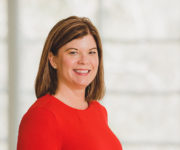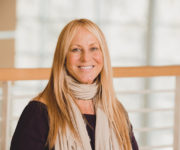Meet the Match
An Advocate for People with Disabilities in Georgia
“Where one journey ends, another begins.” For the past seven years, Tinatin Revazishvili has shared this message across Georgia.
Born and raised in Tbilisi, the first two decades of Tinatin’s life were focused on her education, and later her career. In 2002, she earned a bachelor’s degree in hotel and restaurant marketing from the Tbilisi State Institute of Economic Relations and was soon hired by Tbilisi Marriott Hotel, where she climbed the company ladder.
In 2009, Tinatin’s journey changed course when a car accident left the lower half of her body paralyzed.
“The accident was the beginning of a new life and an introduction into a new community for me,” Tinatin says. “Of course, everything changed. But, I never would have discovered sport if not for my disability.”
For the first time, Tina tried bowling, archery, and horse riding. Within one year of her accident, she began working part-time as a disability advocate for the Coalition of Independent Living on a USAID-supported project to ensure the legal rights of people with disabilities. In 2012, she was elected as vice president of the National Paralympic Committee, where she currently serves as the international relations coordinator.
As she began traveling for tournaments with the NPC, Tinatin noticed the differences in accessibility between Georgia and other European countries. According to statistics, the country has approximately 120,000 people with disabilities. In 2014, Georgia ratified the United Nations Convention on the Rights of Persons with Disabilities, though inaccessibility challenges, stigmas, and limited awareness about the legal rights of the disabled still exist.
Tinatin has actively lobbied government for greater support of people with disabilities. In 2015, Tbilisi built its first fully accessible sports complex, offering fencing, sitting volleyball, basketball, amputee football, boccia, powerlifting, and archery. It was a move in the right direction for Tinatin and the growing disability sport movement in Georgia.
“It is so important for everyone to have the right to play sports,” Tinatin says. “It is an area where a person can rediscover themselves after a disability. Sport allows you to take your life into new directions.”
On top of her many roles, Tinatin also coaches boccia and was named general secretary of the Georgia Boccia Federation. While the sport is new in Georgia, she sees its growth as vital for people with cerebral palsy and severe disabilities. Last October, a team representing the country entered a beginner’s tournament in Poland and finished third—a huge boost for the athletes and a step in the right direction.
Tinatin believes the growth of adaptive sports and the Paralympic movement are fundamental for addressing societal perceptions that people with disabilities are less capable than others. Currently, she estimates only 200 people with disabilities are active in sports—less than 1 percent of the total disabled population. With one of the country’s blind judo competitors winning gold at Rio 2016—the country’s first ever Paralympic medalist at the Games—the country has a growing interest in funding more athletes to compete.
“I want to be an advocate for people with disabilities because I know exactly how a person with a disability thinks and feels,” Tina says. “I am an example that wheelchair users and people with other disabilities can be active and accomplish more than people imagine. I will not give up in this fight for them.”
The next phase in Tinatin’s journey was the U.S. Department of State Global Sports Mentoring Program, where she was mentored by Karin Korb and Amy Rauworth at the Lakeshore Foundation. An organization with a decorated history in disability sport policy, advocacy, and research, Lakeshore is home to one of the most highly-respected adaptive sports programs in the United States. Karin, policy and public affairs coordinator, and Amy, director of policy and public affairs and associate director of the National Center on Health, Physical Activity, and Disability, supported Tinatin by drawing on three decades of experience in organizing and leading initiatives that promote sport for inclusion, health, and fitness. Through their time together, Tinatin focused on what she needs to build and sustain a successful Paralympic movement that touches every corner of Georgia.


